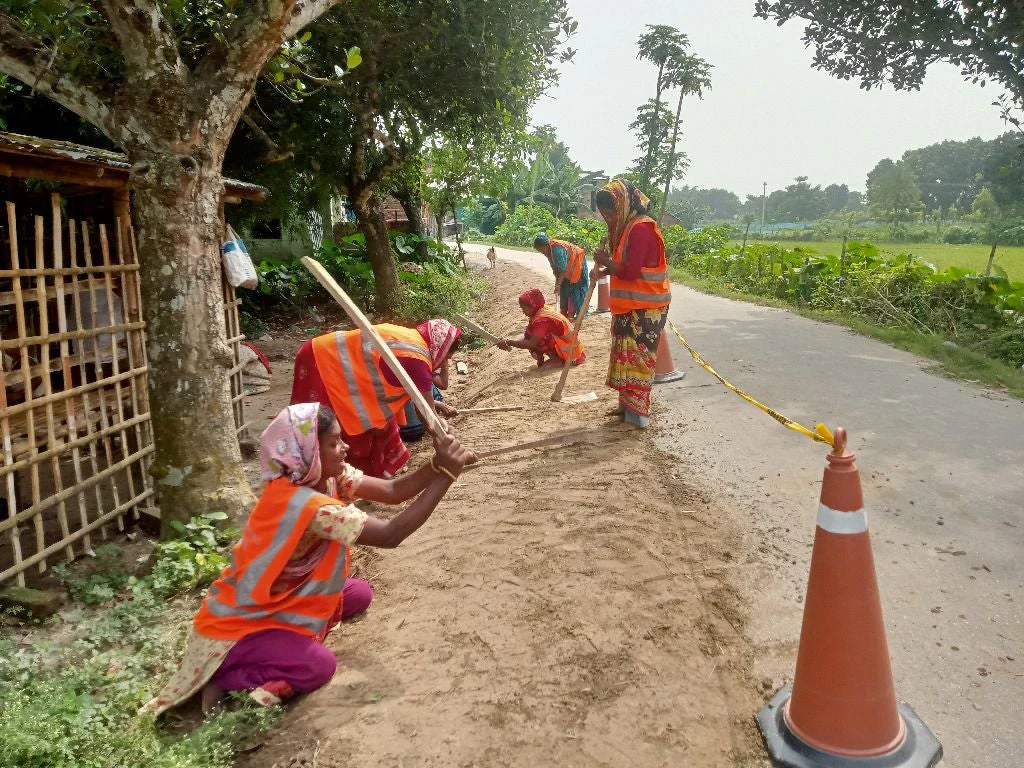 women building road
women building road
Smiling brightly, Bedana Begum proudly points to her florescent orange safety vest. On the top right corner is a small but prominent detail that matters to her the most--the Government of Bangladesh logo. “This jacket is more than just a piece of clothing--it has given us a livelihood, respect in the community, and the opportunity to lead a dignified life,” she explains.
Twenty-one years ago, when Bedana’s husband deserted her, she and her two children were driven to the brink of poverty. While struggling to make ends meet, Bedana came across a job announcement advertised under the Labor Contracting Society (LCS) initiative – formal groups created by Government of Bangladesh to provide guaranteed employment to the poor. After participating in surveys and verification processes, Bedana was selected to join the Society, and trained in road maintenance skills. Soon she learnt how to restore roadside slopes, repair bridge edges, fill sand potholes, and clear culvert channels.
With a monthly salary, and a mobile bank account for direct deposits, in just two years Bedana’s savings grew to 45,000 Bangladeshi Taka (more than US$400). Today, she is self-sufficient, able to pay for medical expenses, and even support her granddaughters’ education.
Bedana is one of the 795 women employed by the Local Government Engineering Department (LGED) under the first phase of the World Bank-financed Bangladesh Western Economic Corridor & Regional Enhancement (WeCARE) Program. With the Roads and Highways Department, as the second implementing agency, the program helps provide efficient, safe, and resilient connectivity along a section of the regional transport corridor and reduce post-harvest losses in surrounding areas. WeCARE has leveraged LCS to focus on employment for women while integrating innovative digital monitoring mechanisms using the Geo-Enabling Initiative for Monitoring and Supervision (GEMS).
A recent impact assessment has shown positive shifts. Over 91 percent of the women employed under WeCARE are able to meet day-to-day expenses compared to 13 percent at the start of the program. Financial counseling has helped 94 percent of the women accumulate savings in the range of US$400 to US$1,500 compared to only 25 percent of women with savings before the program.
The assessment also points to new pathways toward a better life. 214 LCS workers have started their own small home-based enterprises ranging from cattle and poultry rearing to vegetable farming and sewing. Findings note an increase in access to financial services, ownership of assets, along with increased self-confidence among LCS workers. Aligned with the World Bank’s priority to close gender gaps, the initiative is an example of how transport and road projects— a sector mainly dominated by men—can create opportunities for some of the most vulnerable women.
The LCS-WeCARE experience highlights some simple and effective actions to support women’s economic empowerment. First, it’s important to target marginalized women. Through in-person verification, the program followed a thorough selection process for identifying the most vulnerable women in the community who would benefit from employment support. Second, it’s important to leverage the strength of networks. By mobilizing women into community groups, the program provided a supportive cohort for women workers, as they took on formal jobs, many for the first time in their lives. Third, mentorship is key to success. Female supervisors were appointed to serve as mentors and facilitate on-the-job learning. Fourth, financial inclusion is critical to sustainable economic stability. Counseling on finances encouraged savings and helped link women workers to mobile bank accounts. And most importantly, the well-being of workers must be central to any program. The program focused on championing dignity and respect for women working in maintenance.
Momin M. H. Shamaji, the Project Director of the WeCARE Program with the Government of Bangladesh, says, “Besides poverty, we are also dealing with bigger issues of exclusion. The women targeted by the LCS program under WeCARE were isolated in their communities --- they lacked dignity, respect, and welfare. The focus of the program was on the dignity of labor and decent working conditions, with qualified and supportive supervisors who serve as motivators and ensuring proper medical benefits, occupational health and safety standards and facilities such as toilets and work gear.”
In Nepal, the government in partnership with International Labor Organization has recruited over 70 percent women as workers in road maintenance groups -- a majority of whom were from marginalized backgrounds opened bank accounts, received financial literacy and access to credit. In Sri Lanka, the Ministry of Highways has engaged women workers in community road maintenance groups, providing training on road rehabilitation, financial literacy, and additional livelihood skills.
Under WeCARE, the efforts to address women’s economic empowerment have been recognized as a global good practice. They are also in line with evidence that complementary interventions such as access to finance, training, mentoring, and networks are critical in helping women graduate out of poverty.
Looking ahead, WeCARE is exploring ways to deepen support by providing additional training for better-skilled jobs and enterprise development as well as improving access to health, agricultural extension, and other services that could further strengthen their socioeconomic resilience.
As for Bedana, she has eyes set on her next goal. Pointing to the small grocery store at the end of the road she says, “Once I save up enough money, I want to run my own grocery store.”
Support to analytics on gender in Western Economic Corridor & Regional Enhancement (WeCARE) was provided by the South Asia Regional Trade Facilitation Program (SARTFP) - a World Bank trust fund supported by Australia’s Department of Foreign Affairs and Trade (DFAT).




Join the Conversation